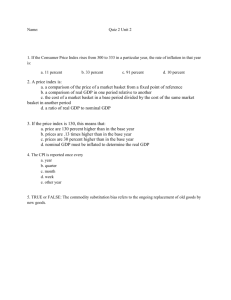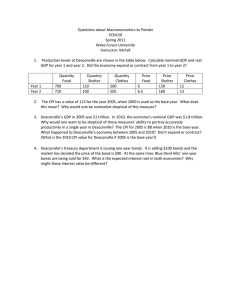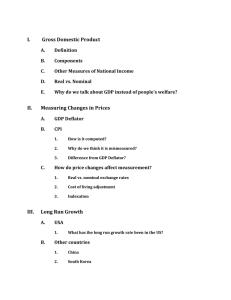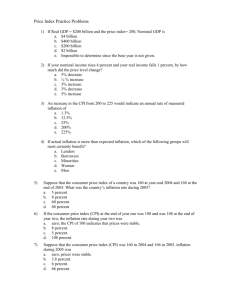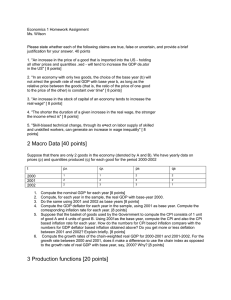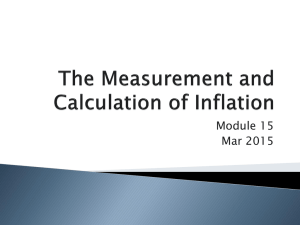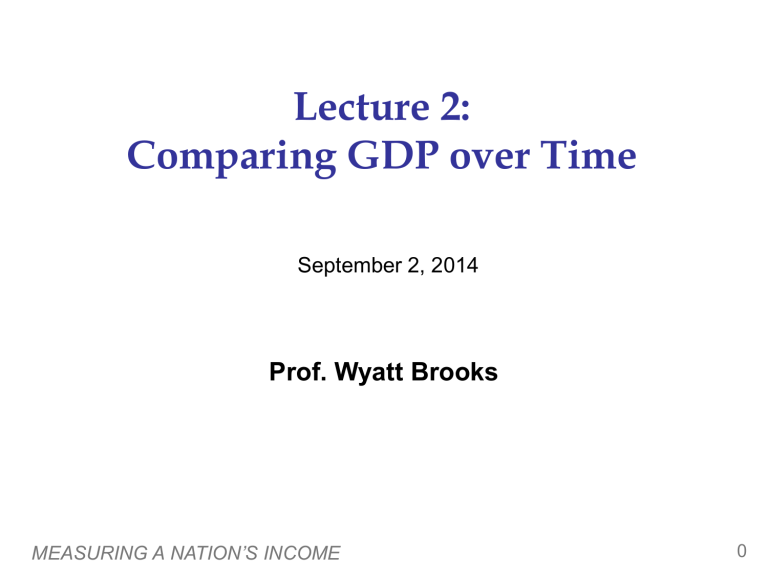
Lecture 2:
Comparing GDP over Time
September 2, 2014
Prof. Wyatt Brooks
MEASURING A NATION’S INCOME 0
US GDP per capita: 1929-2012
51200
25600
12800
6400
3200
1600
Bread, Chicago
1929: 10¢
800
400
1929 1949
MEASURING THE COST OF LIVING
1969 1989
Bread, Chicago
2012: $3.55
2009
1
Real versus Nominal GDP
Inflation is the reduction in the purchasing power of the currency over time
Inflation can distort economic variables like GDP, so we have two versions of GDP:
One is corrected for inflation, the other is not.
Nominal GDP values output using current prices.
It is not corrected for inflation.
Real GDP values output using the prices of a base year . Real GDP is corrected for inflation.
MEASURING A NATION’S INCOME 2
The GDP Deflator
The GDP deflator is a measure of the overall level of prices.
Definition:
GDP deflator = 100 x nominal GDP real GDP
One way to measure the economy’s inflation rate is to compute the percentage increase in the GDP deflator from one year to the next.
MEASURING A NATION’S INCOME 3
A C T I V E L E A R N I N G 1
Computing GDP
2007 (base yr) 2008 2009
P Q P Q P Q
Good A $30 900 $31 1,000 $36 1050
Good B $100 192 $102 200 $100 205
Use the above data to solve these problems:
A. Compute nominal GDP in 2007.
B. Compute real GDP in 2008.
C. Compute the GDP deflator in 2009.
4
A C T I V E L E A R N I N G 1
Answers
2007 (base yr) 2008 2009
P Q P Q P Q
Good A $30 900 $31 1,000 $36 1050
Good B $100 192 $102 200 $100 205
A. Compute nominal GDP in 2007.
$30 x 900 + $100 x 192 = $46,200
B. Compute real GDP in 2008.
$30 x 1000 + $100 x 200 = $50,000
5
A C T I V E L E A R N I N G 1
Answers
2007 (base yr) 2008 2009
P Q P Q P Q
Good A $30 900 $31 1,000 $36 1050
Good B $100 192 $102 200 $100 205
C. Compute the GDP deflator in 2009.
Nom GDP = $36 x 1050 + $100 x 205 = $58,300
Real GDP = $30 x 1050 + $100 x 205 = $52,000
GDP deflator = 100 x (Nom GDP)/(Real GDP)
= 100 x ($58,300)/($52,000) = 112.1
6
The Consumer Price Index (CPI)
GDP Deflator includes the effect of investment goods, imports, exports and so on…
Not closely tied to the prices that consumers face
Use the Consumer Price Index
A measure of how much it costs to maintain your standard of living
the basis of cost of living adjustments (COLAs) in many contracts and in Social Security
MEASURING THE COST OF LIVING 7
How the CPI Is Calculated
1.
Fix the “basket.”
The Bureau of Labor Statistics (BLS) surveys consumers to determine what’s in the typical consumer’s “shopping basket.”
2.
Find the prices.
The BLS collects data on the prices of all the goods in the basket.
3.
Compute the basket’s cost.
Use the prices to compute the total cost of the basket.
MEASURING THE COST OF LIVING 8
How the CPI Is Calculated
4.
Choose a base year and compute the index.
The CPI in any year equals
100 x cost of basket in current year cost of basket in base year
5.
Compute the inflation rate.
The percentage change in the CPI from the preceding period.
Inflation rate
=
CPI this year – CPI last year
CPI last year x
100%
MEASURING THE COST OF LIVING 9
What’s in the CPI Basket?
Housing
3.7%
3.5%
Transportation
6.4%
6.5%
6.5%
42.0%
Food & Beverages
Medical care
Recreation
14.8%
16.7%
Education and communication
Apparel
Other
MEASURING THE COST OF LIVING 10
Two Measures of Inflation
, 1950-2010
MEASURING THE COST OF LIVING 11
Producer Price Index (PPI)
The equivalent of CPI, but the basket of goods is based on what firms purchase
Because costs are passed on, CPI and PPI
15.00% move together
PPI
10.00%
CPI
5.00%
0.00%
1948 1956 1964 1972
-5.00%
MEASURING THE COST OF LIVING
1980 1988 1996 2004 2012
12
Correcting Variables for Inflation:
Comparing Dollar Figures from Different Times
Amount in today’s dollars
=
Amount in year T dollars x
Price level today
Price level in year T
MEASURING THE COST OF LIVING 13
Correcting Variables for Inflation:
Comparing Dollar Figures from Different Times
Inflation makes it harder to compare dollar amounts from different times.
Example: the minimum wage
$1.15 in Dec 1964
$5.85 in Dec 2007
Did minimum wage have more purchasing power in Dec 1964 or Dec 2007?
MEASURING THE COST OF LIVING 14
The U.S. Minimum Wage in Current Dollars and 2009 Dollars, 1938-2010
A C T I V E L E A R N I N G 4
Converting to “today’s dollars”
Annual tuition and fees, average of all public fouryear colleges & universities in the U.S.
1986-87: $1,414 (1986 CPI = 109.6)
2006-07: $5,834 (2006 CPI = 203.8)
After adjusting for inflation, did students pay more for college in 1986 or in 2006? Convert the 1986 figure to 2006 dollars and compare.
16
A C T I V E L E A R N I N G 4
Answers
Annual tuition and fees, average of all public fouryear colleges & universities in the U.S.
1986-87: $1,414 (1986 CPI = 109.6)
2006-07: $5,834 (2006 CPI = 203.8)
Solution
Convert 1986 figure into “today’s dollars”
$1,414 x (203.8/109.6) = $2,629
Even after correcting for inflation, tuition and fees were much lower in 1986 than in 2006!
17
Correcting Variables for Inflation:
Indexation
A dollar amount is indexed for inflation if it is automatically corrected for inflation by law or in a contract.
For example, the increase in the CPI automatically determines
the COLA in many multi-year labor contracts
the adjustments in Social Security payments
(since 1975) and federal income tax brackets
(since 1985)
MEASURING THE COST OF LIVING 18
Correcting Variables for Inflation:
Cost of Living Adjustments (COLA)
MEASURING THE COST OF LIVING 19
Problems with the CPI:
Substitution Bias
Over time, some prices rise faster than others, hence relative prices change.
Consumers substitute toward goods that become relatively cheaper.
The CPI misses this substitution because it uses a fixed basket of goods.
Thus, the CPI overstates increases in the cost of living.
MEASURING THE COST OF LIVING 20
Problems with the CPI:
Introduction of New Goods
The introduction of new goods increases variety, allows consumers to find products that more closely meet their needs.
In effect, dollars become more valuable.
The CPI misses this effect because it uses a fixed basket of goods.
Thus, the CPI overstates increases in the cost of living.
MEASURING THE COST OF LIVING 21
Problems with the CPI:
Unmeasured Quality Change
Improvements in the quality of goods in the basket increase the value of each dollar.
The BLS tries to account for quality changes but probably misses some, as quality is hard to measure.
Thus, the CPI overstates increases in the cost of living.
MEASURING THE COST OF LIVING 22
Problems with the CPI
Each of these problems causes the CPI to overstate cost of living increases.
The BLS has made technical adjustments, but the CPI probably still overstates inflation by about 0.5 percent per year .
This is important because Social Security payments and many contracts have COLAs tied to the CPI.
MEASURING THE COST OF LIVING 23
Correcting Variables for Inflation:
Real vs. Nominal Interest Rate
The nominal interest rate:
the interest rate not corrected for inflation
the rate of growth in the dollar value of a deposit or debt
The real interest rate:
corrected for inflation
the rate of growth in the purchasing power of a deposit or debt
Real interest rate
= (nominal interest rate) – (inflation rate)
MEASURING THE COST OF LIVING 24
Correcting Variables for Inflation:
Real vs. Nominal Interest Rate
Example:
Deposit $1,000 for one year.
Nominal interest rate is 9%.
During that year, inflation is 3.5%.
Real interest rate
= Nominal interest rate – Inflation
= 9.0% – 3.5% = 5.5%
The purchasing power of the $1000 deposit has grown 5.5%.
MEASURING THE COST OF LIVING 25
Real and Nominal Interest Rates in the U.S.,
1950-2010
MEASURING THE COST OF LIVING 26
Quick Intro to the Federal Reserve Bank
The Federal Reserve Bank of the United States is the monetary authority of the USA.
Monetary Authority: Government body responsible to determining how much money is in the economy
Examples: US Federal Reserve ($), European
Central Bank ( €), Bank of England (£), People’s
Bank of China ( 元 ), Bank of Japan (¥)
One goal of the Federal Reserve: price stability
The Federal Reserve was created on
December 23, 1913
MEASURING THE COST OF LIVING 27
2500%
US Price Level (CPI) relative to 1913
2000%
1500%
1000%
500%
0%
1913 1923 1933 1943 1953 1963 1973 1983 1993 2003 2013
MEASURING THE COST OF LIVING 28
40.00%
30.00%
20.00%
10.00%
0.00%
1912
-10.00%
-20.00%
CPI Annual Changes over Time
1932 1952 1972 1992 2012
-30.00%
-40.00%
MEASURING THE COST OF LIVING 29
40.00%
30.00%
20.00%
10.00%
0.00%
1701
-10.00%
-20.00%
-30.00%
Inflation Measure: 1701-1914
1751 1801 1851 1901
-40.00%
Source: John McCusker, “How Much is That in Real Money?”,
Proceedings of the American Antiquarian Society (2001)
MEASURING THE COST OF LIVING 30
Next Class
Growth over the long run
Read Mankiw chapter 12
Make sure to do the first two sections of the homework based on the lectures
MEASURING THE COST OF LIVING 31
